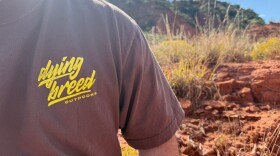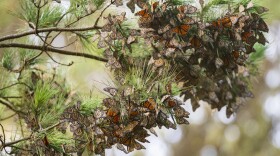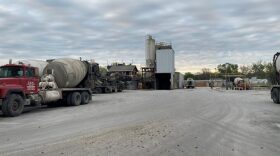-
The Chinati Mountains State Natural Area encompasses 39,000 acres of pristine Chihuahuan Desert landscape. Marfa Public Radio recently got a sneak peek of the new park, which is not set to formally open until 2032.
-
Dying Breed Outdoors is a local clothing brand that started out with a Texas native making a few fishing shirts for friends. Now, they are working to bring eyes to this Texas State Park.
-
The Rio Grande — the border river shared by the United States and Mexico is experiencing a severe water crisis demanding urgent attention. That's according to a new study that calls for immediate investments in solutions.
-
The last week of October is International Bat Week. Our Samantha Larned reports on research at Texas Tech's Natural Resource Management Department into how bats adapt to human infrastructure in the state. Governor Greg Abbott announced Wednesday that the Texas Workforce Commission has awarded grants to four West Texas school districts as part of the Jobs and Educations for Texans program. Two of those grants are in partnership with South Plains College to train Denver City ISD and Seagraves ISD.
-
Bats love to munch on insects like stink bugs and moths. Some farmers are now relying on the mammals for pest control – and ditching chemicals.
-
The ground-dwelling bird's preferred grassland habitat overlaps with agricultural and energy-rich regions, putting the species' future in the hands of private landowners. In the second installment of a two-part series, StateImpact's Chloe Bennett-Steele reports on continued conservation efforts for the species.
-
Virtual fencing uses GPS collars, sounds and electrical cues to move cattle across a landscape. Along with saving ranchers time, researchers say this new technology can help protect, and create, wildlife habitat.
-
Every fall, West Texans look to the skies for one of nature’s most remarkable journeys: the migration of the monarch butterfly. But monarch butterfly populations are declining due to threats like habitat loss, herbicide use and climate change.
-
A wave of massive data centers is expanding across Texas, prompting warnings from experts who say the new water demands could push the state’s already strained supply to the brink.
-
Lubbock Lake Landmark is a snapshot of the land before settlement, preserving archeological evidence of early-human life and the natural history of the region’s plants and animals. Through its discoveries, education, and conservation, staff with the Landmark have reintroduced native wildlife driven out of the area, and continue to explore possibilities for the land and for those who love it.

Play Live Radio
Next Up:
0:00
0:00
Available On Air Stations

















